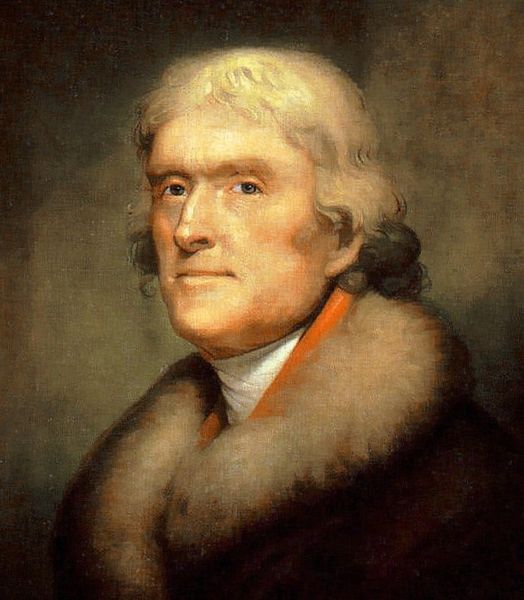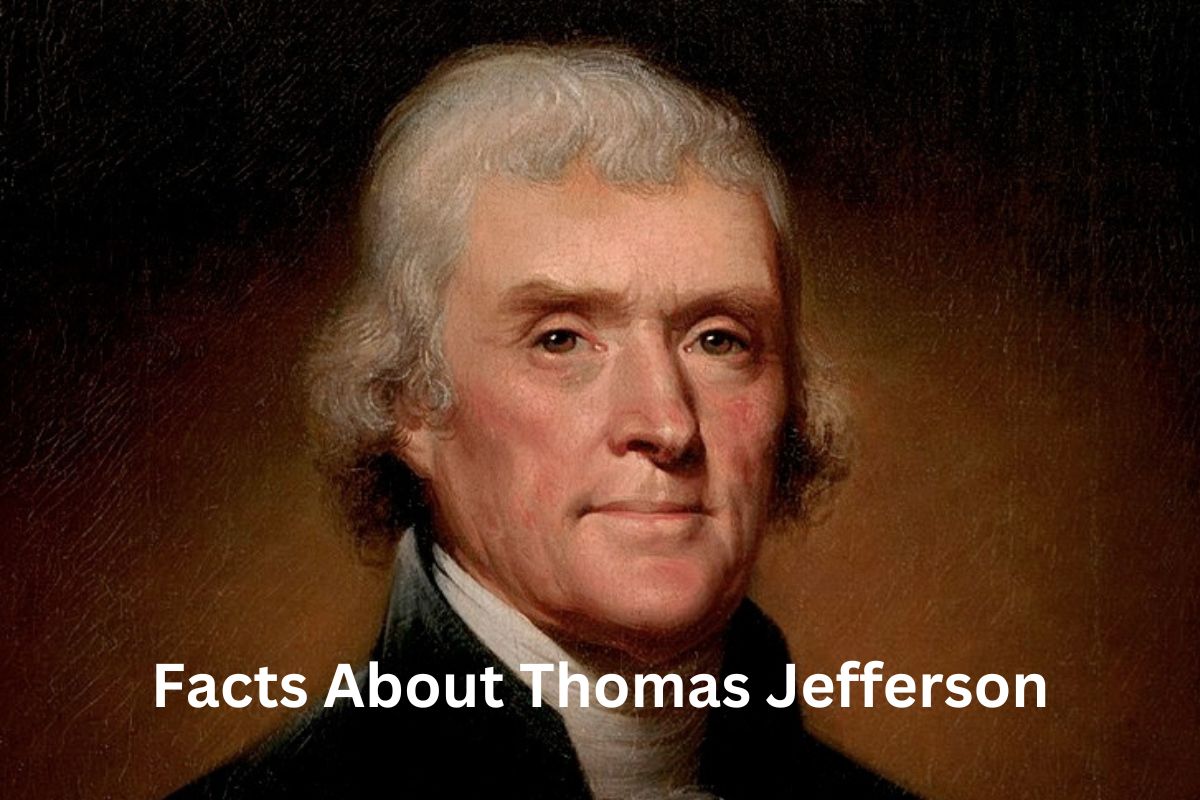Thomas Jefferson, born on April 13, 1743, in Shadwell, Virginia, was the third President of the United States, serving from 1801 to 1809. He is renowned for his role as the principal author of the Declaration of Independence, which proclaimed the fundamental principles of American democracy.
Jefferson was a staunch advocate for individual rights and liberties, emphasizing limited government and the protection of individual freedoms. Throughout his life, he demonstrated a diverse range of interests, including architecture, agriculture, and diplomacy.
However, Jefferson’s legacy is not without controversy, as he both condemned slavery while owning enslaved people himself. Despite these complexities, his contributions to American history and political philosophy continue to shape the nation’s ideals and discussions.
Thomas Jefferson Facts
1. Thomas Jefferson was the third President of the United States, serving from 1801 to 1809
Thomas Jefferson was the third President of the United States, serving from 1801 to 1809. Born on April 13, 1743, in Shadwell, Virginia, he was the eldest son of Peter Jefferson and Jane Randolph.
He grew up on his family’s plantation, where he developed a deep connection to the land and an appreciation for nature. Jefferson received a classical education, studying Latin, Greek, and philosophy.

2. Jefferson is most famous for drafting the Declaration of Independence
Jefferson’s most notable contribution to American history is his role in drafting the Declaration of Independence. In June 1776, the Second Continental Congress appointed a committee to write a formal statement announcing the colonies’ separation from Great Britain.
Also Read: Thomas Jefferson Accomplishments
Jefferson was chosen to draft the document due to his eloquence and writing skills. The Declaration, adopted on July 4, 1776, proclaimed the inherent rights of individuals and the principles of liberty, equality, and self-government.
Jefferson’s words, particularly the opening lines, “We hold these truths to be self-evident, that all men are created equal,” have become some of the most iconic in American history.
3. Jefferson was a strong advocate for individual rights and liberties
Thomas Jefferson was a staunch advocate for individual rights and liberties. Influenced by Enlightenment thinkers such as John Locke, Jefferson believed in the fundamental rights of life, liberty, and the pursuit of happiness.
He saw government as a necessary institution but emphasized that its power should be limited to protect individual freedoms. Jefferson’s political philosophy shaped the foundation of American democracy.
Also Read: Thomas Jefferson Timeline
He played a pivotal role in the formation of the Democratic-Republican Party, which opposed the Federalist Party led by Alexander Hamilton.
The Democratic-Republicans championed states’ rights, agrarianism, and a strict interpretation of the Constitution, while the Federalists favored a strong central government and a loose interpretation of the Constitution. Jefferson’s presidency marked a shift in American politics and a triumph for democratic principles.

4. Jefferson played a crucial role in the expansion of the United States through the Louisiana Purchase in 1803
One of the significant achievements associated with Thomas Jefferson is the Louisiana Purchase. In 1803, Jefferson negotiated the purchase of the Louisiana Territory from France for $15 million.
This vast territory, which stretched from the Mississippi River to the Rocky Mountains, effectively doubled the size of the United States.
The acquisition of the Louisiana Territory provided ample land for westward expansion, access to the valuable port of New Orleans, and control over the Mississippi River, which was crucial for trade and transportation.
5. Jefferson was a founding member of the Democratic-Republican Party
Thomas Jefferson was a founding member of the Democratic-Republican Party. The party emerged as a response to the Federalist Party’s policies, which were seen as favoring a strong central government and a commercial economy.
The Democratic-Republicans, led by Jefferson and James Madison, championed the principles of agrarianism, states’ rights, and strict adherence to the Constitution. They believed in limiting the powers of the federal government, promoting individual liberties, and encouraging an agrarian-based economy.
The Democratic-Republican Party’s ascendancy marked a shift in American politics and laid the groundwork for future political parties and ideologies.
6. Jefferson served as the United States Secretary of State from 1790 to 1793 under President George Washington
Prior to becoming President, Thomas Jefferson served as the United States Secretary of State from 1790 to 1793 under President George Washington. As Secretary of State, Jefferson was responsible for handling foreign affairs and diplomacy.
He played a crucial role in shaping early American foreign policy, particularly in dealing with European powers such as France and Great Britain.
Jefferson advocated for a policy of neutrality and non-intervention in foreign conflicts, seeking to protect American interests while avoiding entanglements in European wars.
7. Jefferson was a polymath and had a wide range of interests
Thomas Jefferson was known for his diverse range of interests and talents. Besides his political career, he was a skilled architect and designed his own residence, Monticello, which showcased his appreciation for classical architecture and innovative design.
Monticello became a symbol of Jefferson’s intellectual curiosity and his commitment to integrating art and science into everyday life. Furthermore, Jefferson was an avid inventor and made significant contributions to fields such as agriculture, architecture, and technology.
Among his inventions were a plow, a swivel chair, and a polygraph (a device for duplicating writing).
8. Jefferson founded the University of Virginia in 1819
Another notable accomplishment of Thomas Jefferson was the founding of the University of Virginia (UVA). Established in 1819, UVA was the first university in the United States to be established on secular principles, separating it from religious influence.
Jefferson believed in the importance of education and sought to create an institution that promoted freedom of thought, religious tolerance, and the cultivation of civic-minded citizens.
He personally designed the university grounds, including the iconic Rotunda building, and implemented innovative ideas such as a decentralized faculty system and a curriculum focused on liberal arts and sciences.
Jefferson’s vision for UVA served as a model for future American universities and emphasized the importance of higher education in a democratic society.
9. Jefferson was an avid supporter of agriculture and believed in the importance of farming and self-sufficiency
Thomas Jefferson had a profound interest in agriculture and believed in its central importance to the nation’s well-being. He saw agriculture as the foundation of a self-sufficient and independent society.
Jefferson promoted agricultural innovations and scientific advancements in farming techniques. He conducted experiments on his Monticello plantation, implementing crop rotation and introducing new crops, such as various fruits and vegetables.
He also advocated for the development of agricultural societies and encouraged farmers to share knowledge and best practices. Jefferson’s dedication to agricultural progress contributed to the growth of American farming and influenced generations of farmers.
10. Jefferson had a complicated relationship with slavery
One of the complex aspects of Thomas Jefferson’s legacy is his contradictory stance on slavery. While he publicly denounced slavery as a moral and political evil and acknowledged that it violated the principles of liberty, he owned enslaved individuals throughout his life.
At the time of his death, Jefferson owned more than 600 enslaved people. Despite expressing reservations about the institution, he did not take significant steps to emancipate his slaves during his lifetime.
However, in his writings, Jefferson acknowledged the inherent contradiction between slavery and the principles of the American Revolution, and he expressed hope that future generations would resolve the issue.
11. Jefferson corresponded with many influential figures of his time, including John Adams, James Madison, and Marquis de Lafayette
Thomas Jefferson maintained a vast network of correspondence with numerous influential figures of his time. His letters provide valuable insights into his thoughts, ideas, and the political climate of the era.
He engaged in extensive correspondence with fellow Founding Fathers such as John Adams, James Madison, and James Monroe. Jefferson’s letters covered a wide range of topics, including politics, philosophy, agriculture, and personal matters.
His intellectual exchanges with prominent figures both within and outside the United States helped shape his political philosophy and influenced the course of American history.
12. Jefferson was a strong proponent of religious freedom
Religious freedom was a fundamental principle for Thomas Jefferson. He strongly believed in the separation of church and state and championed religious liberty. Jefferson played a significant role in the passage of the Virginia Statute for Religious Freedom in 1786.
The statute disestablished the Anglican Church as the official religion of Virginia and protected the rights of individuals to practice any religion of their choice.
Jefferson’s advocacy for religious freedom stemmed from his belief that government should not interfere with matters of faith and that individuals should be free to follow their own conscience.
13. Jefferson’s legacy is still debated today
Thomas Jefferson’s legacy is a subject of ongoing debate and scrutiny. While he made notable contributions to American democracy and intellectual thought, his record on issues of race and slavery has drawn criticism.
Some view Jefferson as a hypocrite, as his ownership of enslaved people contradicted his espoused principles of equality and freedom. Moreover, his views on race were complex and, at times, reflected the prevailing racist attitudes of his era.
Despite these criticisms, Jefferson’s impact on American history remains significant, and his ideas on individual rights, limited government, and democracy continue to shape the nation’s identity. The complexities of his legacy serve as a reminder of the challenges and contradictions present in the country’s history.
